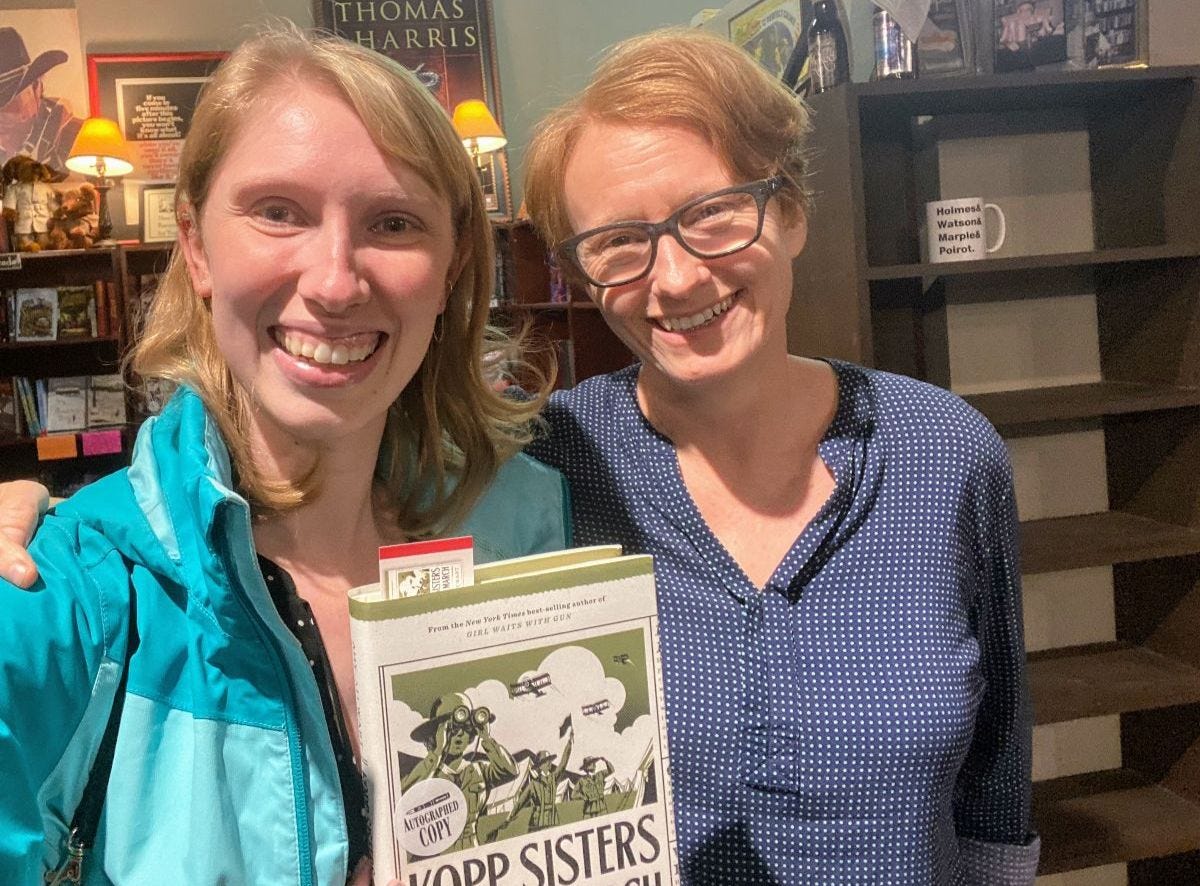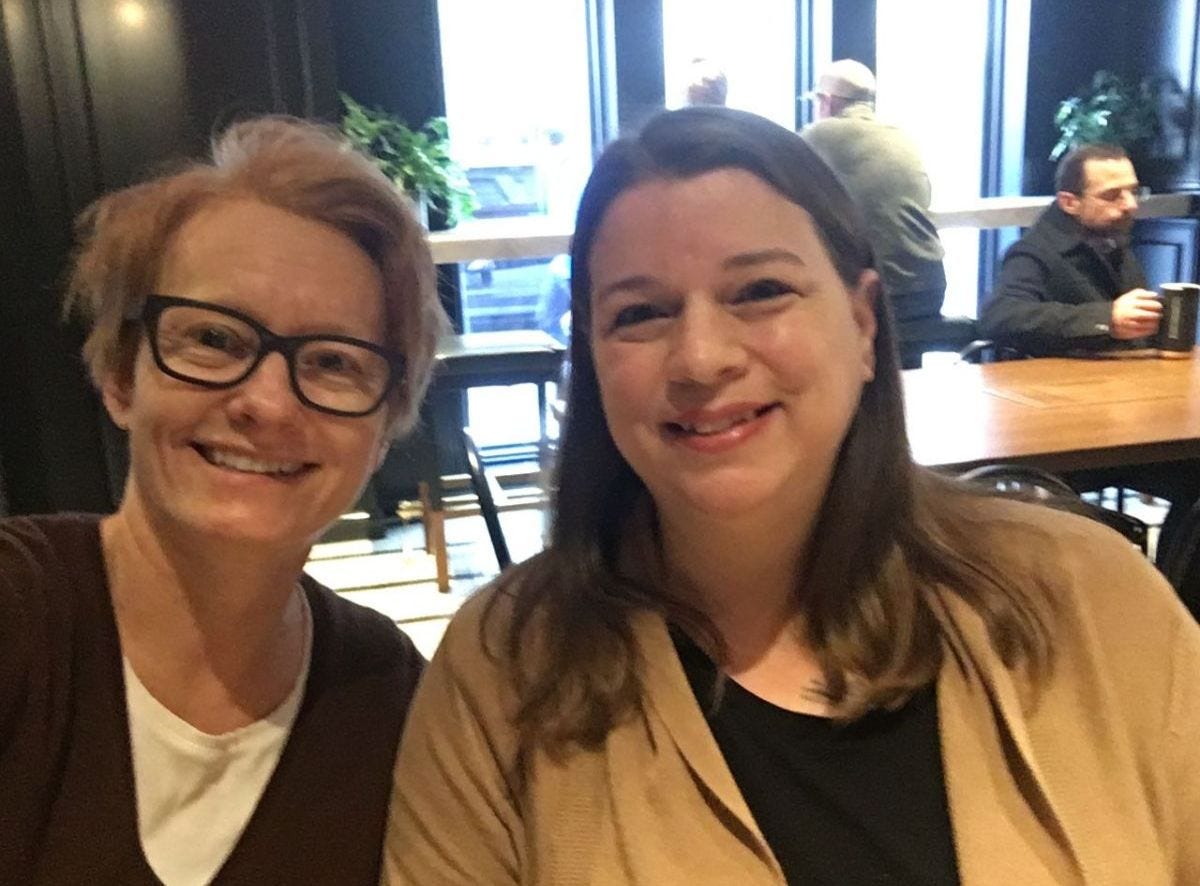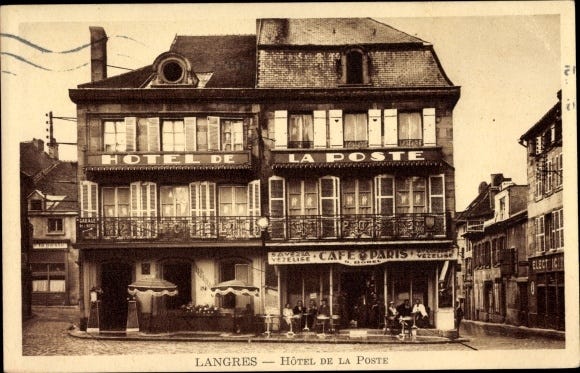Kopp Sisters Literary Society--Deleted Scenes & Survey Last Call
Kopp Sisters Literary Society
Last call for our survey!

I'm about to close the survey and send it to my publisher
If you'd like to take the survey before I send the results to my publisher, here's your last chance. Your responses will help me convince my publisher to print 50 extra advance copies for all of you next year. I have 24 responses so far and would love to hear from the rest of you, if you're so inclined.
I'll be closing the survey November 10.
Some of you asked me what is most helpful to authors. The answer is....
Well, the answer is Amazon and Goodreads. I know, I know--Amazon owns Goodreads, so really what I'm saying is Amazon and Amazon. And you all know that I adore independent bookstores, so it pains me a little to say that. But the fact is that Amazon and Goodreads reviews are exported into a lot of other platforms, including the computer systems that booksellers and librarians use to decide what books to order. So reviews there really do matter a lot.
It was so good to see you on the road!




It happened! I was able to get together with some of you IRL on this tour! Thank you so much for reaching out to me, and for turning up in spite of busy work schedules, commutes, inclement weather, etc. So great to see Heidi in Minneapolis, Kelsey in Houston, Adriene in Dallas, and Amy, Julie, and Juli on Skype! (sorry I didn't get a pic of us on Skype)
The Minor Tragedy of a Deleted Scene

I'm just finishing up Book 6 (out next September, tentatively titled Dear Miss Kopp) and just last week, I finally had to let go of a couple of bits that I loved but cannot keep. They just don't fit. You'd think anyone could find a place to wedge a few paragraphs, but they were like a pair of shoes sitting in the middle of the hallway--I just kept tripping over them.
Both of them come directly from a trip I took to France to research the location. I wrote bits of these scenes in France. That's part of why I hate to get rid of them--I traveled so far to find them!
So, I thought I'd send them to you. Two short bits of writing that will otherwise never see the light of day.
The first is a fictional history of this hotel, pictured above. It's where Norma is (fictionally) staying during WWI. Americans really were housed there during the war. Here's Norma:
Our rooms are wedged into an attic that should not, by all rights, even exist. From what I can piece together, a dispute dating back to the Napoleonic era is to blame for our present circumstances. Aggie asked me to write about our lodgings, so I’ll tell you the story.
The hotel was once owned by two men whose names are unimportant – let’s call them the hotelier and the banker. The banker, of course, was the fellow who put up the money, and the hotelier was in charge of running the place.
After a chimney fire destroyed half the roof (the northern half), the men couldn’t agree on how to rebuild. The banker wanted a higher roof, so that four more rooms might be tucked under the eaves. The hotelier thought the attic rooms would be frigid in winter and stifling in the summer and didn’t want to hear the guests complain. Each man possessed a half-ownership in the hotel, but it had never occurred to either of them to say who owned which half.
In the end, the banker, being in possession of the purse, rebuilt the burnt end of the roof to his liking, but the hotelier argued that in doing so, the banker had claimed full ownership of the northern half of the hotel, which meant that he, the hotelier, owned the southern half and wouldn’t allow it to be touched.
They apparently had no means of resolving the dispute. Winter was approaching. Their compromise was to have the new roof stop abruptly in the middle of the building, with a sort of half-wall to connect it to the old roof, giving the hotel the odd appearance of two disparate buildings of varying heights that had been stitched together.
The hotelier eventually lost his half-interest in the hotel, as one does when one is in business with a banker. The place is now owned by the banker’s granddaughter, Madame Angevine, herself elderly. Aggie and I occupy one of “the new rooms” in the attic. (Everyone in town still calls them that, after several decades.) As the hotelier predicted, it's so cold in winter that we often thought we’d be better off outside under a nice soft blanket of snow. With summer coming on, it’s already stifling.

Okay, so there's that...good-bye to Norma's history of the hotel. Also, I had to delete her description of her walk to work at the fort, and I also hated to cut this (because I went there and took that walk!), but honestly, I think I loved that walk more than anyone will love my description of it. Click the picture above to see the video I posted to Facebook of the French-speaking goats.
Anyway, here's Norma's take on the French countryside:
This walk is not unpleasant, even in winter, for as you know I’m accustomed to trudging through snow and ice. It’s only a matter of a few steps from village to countryside: once you’re outside the great stone wall, there’s nothing much but fields and farmhouses. My path takes me along what they call the old Roman road, which is unpaved, but well-trod and well-packed. The farmers prefer it to any road carrying automobiles. They’re not about to let a machine spoil the countryside, and I stand with them on this point.
The first farm I pass keeps a type of dairy cow similar to a Holstein, but it doesn’t keep them terribly well: just last week I noticed three of them flicking their ears in a manner suggestive of mites. I considered stepping into the farmhouse to instruct the farmer as to their care, but the farmhouse sits high up on a ridge, removed from the livestock (which explains, to my mind, why the mites have been allowed to fester) and I couldn’t be bothered with such a detour. If they don’t improve in a few days, I’ll find some oil in town and do their ears myself.
Beyond that lies a wheat field, the sort you see in pictures with the straw cut and baled in summer and left in mounds. A field like this is a haven for mice. As such, it’s not unusual, especially in the morning, to see a hawk diving for its breakfast just like they did in Wyckoff.
Around the next bend awaits a herd of goats with their peculiar French accents. Don’t ever try to tell me that a goat can’t bleat in the language of its master, because these do. They also respond only to French commands. I twice ordered them not to gnaw on the gate latch, knowing that they’d wear it down eventually, but the only time those goats heard me and backed away was when I issued my command in their mother tongue.
There’s a shed of pigs, too, off in the distance, and a pair of horses that are sent out to pasture most days. The ditches are filled with what look to be Gallic versions of Joe-Pye weed and Queen Anne’s lace, which draw more bees than you’ve ever seen in your life. In the evening I have learned to recognize the peculiar chirping of the bats who live in the old stone outcroppings on the hill and swoop down to pick mosquitoes out of the air. In spring there are swallows, too, darting back and forth with some kind of fluff to feather their nests.
For the rest of it you need only imagine any painting you’ve ever seen of the French countryside: the patchwork of pale green clover, the gold wheat straw, and all that brown soil plowed into furrows. Hedgerows rather than fences divide the fields, a practice I heartily approve of, as hedges require no mending, and want only a hard pruning in the fall to keep the brambles from spreading into the fields. I doubt any of our neighbors in New Jersey would agree to it. They like their fences, and they like to be able to look through their fences to see what the neighbors are up to. Hedgerows block the view, but the French don’t mind.
That's it for now! Have a lovely autumn, enjoy your lives, and stay tuned for more news of the next book. I'm heading home to finish it now.


